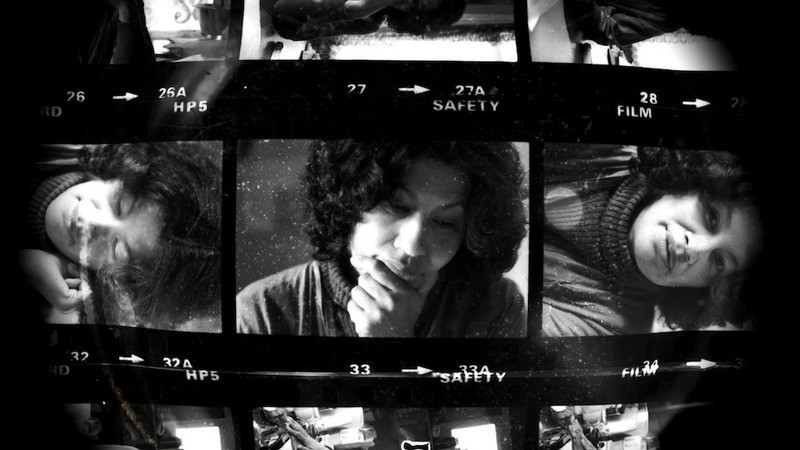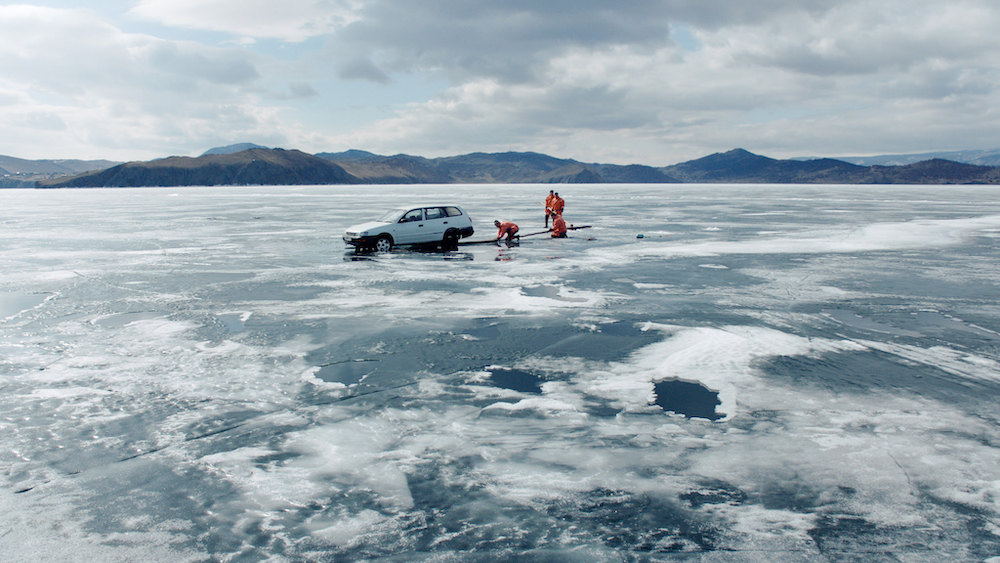“Aquarela” is one of the most frightening and persuasive movies I’ve ever seen about the destruction created by climate change. With incredibly cinematic imagery and a succinct narrative conveyed by editing instead of talking heads or voiceover, the film depicts how global warming turns peaceful ice into vengeful tidal waves.
“Immersive” is the best word to describe the experience of watching the unmissable “Aquarela,” which you must treat with same as-large-and-as-loud-as-possible dedication you do for blockbusters or repertory viewings of “2001: A Space Odyssey.” Directed by Victor Kossakovsky, the film hooks you in with “how did they shoot that?” images on the ice, where you’re watching a crew try to dig a car out of an icy body of water, wondering if the camera is about to go for a frozen plunge itself. But then it very succinctly paints a picture of how it’s not natural for this body of water to be thawing this early in the season, which takes its toll on people and their livelihood. And on a larger scale, it’s not natural to see entire islands of ice break up and ebb and flow on the water before crashing into the sea like dinosaurs, their intricate patterns and amazing size just disappearing into the water. Suddenly the images captured of ice—as light continues to poke holes through it and showcase their intricate designs—have an ominous nature.
Music is one of the film’s most abrasive aspects, as it’s filled with screeching heavy metal guitars by Apocalyptica that match the crash waves and thunderous drums that seemingly lift the tidal waves higher and higher. But aside from demanding your attention like a Lars Von Trier needle drop, they enhance the story’s imagery. When a wall of water builds, consuming the frame and looking taller than any city skyscraper, the furious music is reminiscent of when Gustav Holst portrayed the destruction brought upon Earth in his “The Planets” piece “Mars.”
Standing apart from other docs that mourn the state of our planet, there’s no feel-good ballad played at the end of “Aquarela,” or a website that is mentioned after the final images with advice on what we can do. Instead, with its pitch-black elegance, the movie is matter-of-fact about what has already happened; the irrevocable damage that has been wrought. At least when the Tralfamadorian alien civilization finds our planet completely underwater however many months from now, we will have this horrifying yet gorgeous artifact that documents our downfall.

Richard Ladkani’s “Sea of Shadows” is an action-packed doc about the crisis concerning the “cocaine of the sea,” a fish called the totoaba. The Mexican fish has a bladder that is prized by the Chinese as having healing powers, causing a black market of illegal fisherman who seek the totoaba to hunt and kill it. The nets from these illegal fishermen harm the dying-out vaquita fish, while also messing with the livelihoods of legal fishermen. Balancing both major issues with this double tragedy with glimpses of how activists and journalists are trying to combat them, “Sea of Shadows” has epic ambitions it falls short of.
Ladkani takes an action thriller’s approach to getting this message, and its imperative nature, across: big music cues, handheld cameras, action that takes place with night vision, on-camera subjects whose voices garbled and image obscured to protect them. “Sea of Shadows” is on the ground with men as they hunt a black market king named Oscar Parra, it’s on the boat as activists try to stop illegal fishermen from putting down the deadly nets. It even has the footage captured by a drone before someone shoots it down.
But Ladkani’s approach is noticeably scattershot, examining these two main conflicts that come with the hunting of the vaquita and hoping that the footage is enough. Distinct heroes and villains get tangled up in the sensational action that Ladkani wants to use to get the viewer’s attention. It makes for an illuminating documentary that nonetheless doesn’t maintain the dramatic tension it desires, and one that fails to make an articulate argument about how the loss of the vaquita would affect the globe’s ecosystem. Watching “Sea of Shadows” you recognize the importance of its smaller issues, but it does not make its maximum impact with storytelling alone.

The documentary programming at Sundance sometimes likes to give a shout-out to the people who have helped make it such an eccentric and progressive place for filmmaking. A few years ago, it had the doc “Film Hawk” about indie legend (and very nice guy to talk to in line) Bob Hawk, celebrating how he influenced the scene on a personal and major level, and also became a huge figure of the festival.
This year there’s “Merata: How Mum Decolonised the Screen,” about a very important woman in the history of film you may not know about—a radical feminist, feature director and documentarian, who was also the first independent Maori filmmaker. Her features and docs helped the efforts of “decolonizing cinema,” and she supported a wealth of moviemakers along the way (including the festival’s beloved Taika Waititi, director of “Boy” and “Thor: Ragnarok”). She is also the inspiration behind the Sundance Institute Merata Mita Fellowship, which the festival has been giving to “an Indigenous filmmaker from a global pool of nominees,” awarding them a cash grant and a “year-long continuum of support” with their own filmmaking.
Merata Miti’s life story is told here in a straight-forward fashion by her youngest son, Hepi, who uses a lot of footage from his mother’s archives, sometimes from feature productions she worked on or the many news reports about her. Hepi also receives help from interviews with his siblings, intertwining their personal reflections about their mother with her stamp on activism and film history. Miti becomes an assuredly amazing subject, especially as we see how she provided the under-represented filmmaking perspective of a Maori woman, which was more welcomed by audiences in other continents than at home.
But the charm of this story would shine much brighter if the filmmaking itself was more inspired. Miti’s presentation of this story—with talking head interviews, shots that slowly scan or zoom in on photos, and voiceover—is distinctly unremarkable as compared to the fascinating history. As he successfully makes us appreciate his mother’s passions and progress, it’s strange to see something so personal packaged like a lecture.












